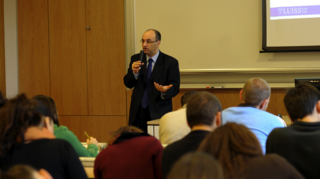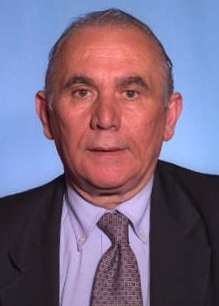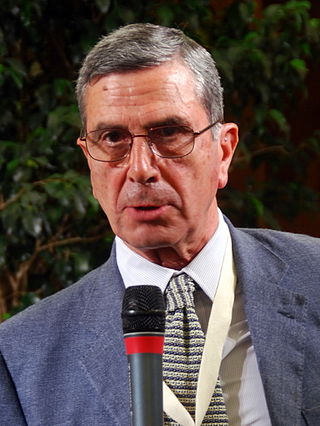
National Alliance was a national conservative political party in Italy. It was the successor of the Italian Social Movement (MSI), a neo-fascist party founded in 1946 by former followers of Benito Mussolini that had moderated its policies over its last decades and finally distanced itself from its former ideology, a move known as post-fascismo, during a convention in Fiuggi by dissolving into the new party in 1995.

The politics of Italy are conducted through a parliamentary republic with a multi-party system. Italy has been a democratic republic since 2 June 1946, when the monarchy was abolished by popular referendum and a constituent assembly was elected to draft a constitution, which was promulgated on 1 January 1948.

Silvio Berlusconi was an Italian media tycoon and politician who served as the prime minister of Italy in four governments from 1994 to 1995, 2001 to 2006 and 2008 to 2011. He was a member of the Chamber of Deputies from 1994 to 2013; a member of the Senate of the Republic from 2022 until his death in 2023, and previously from March to November 2013; and a member of the European Parliament (MEP) from 2019 to 2022, and previously from 1999 to 2001. With a net worth of US$6.8 billion as of June 2023, Berlusconi was the third-wealthiest person in Italy at the time of his death.

Forza Italia was a centre-right liberal-conservative political party in Italy, with Christian-democratic, liberal, social-democratic and populist tendencies. It was founded by Silvio Berlusconi, who served as Prime Minister of Italy four times.

Gianfranco Fini is an Italian politician who served as the president of the Italian Chamber of Deputies from 2008 to 2013. He is the former leader of the far-right Italian Social Movement, the conservative National Alliance, and the center-right Future and Freedom party. He was Deputy Prime Minister and Minister of Foreign Affairs in Silvio Berlusconi's government from 2001 to 2006.

The Network, whose complete name was Movement for Democracy – The Network, was a political party in Italy led by Leoluca Orlando.

Right-wing populism, also called national populism and right-wing nationalism, is a political ideology that combines right-wing politics and populist rhetoric and themes. Its rhetoric employs anti-elitist sentiments, opposition to the Establishment, and speaking to or for the "common people". Recurring themes of right-wing populists include neo-nationalism, social conservatism, economic nationalism and fiscal conservatism. Frequently, they aim to defend a national culture, identity, and economy against perceived attacks by outsiders. Right-wing populism has remained the dominant political force in the Republican Party in the United States since the 2010s.

The first Berlusconi government was the 51st government of the Italian Republic.

The political career of Silvio Berlusconi (1994–2011) began in 1994, when Berlusconi entered politics for the first time serving intermittent terms as Prime Minister of Italy from 1994 to 1995, 2001 to 2006 and 2008 to 2011, his career was racked with controversies and trials; amongst these was his failure to honour his promise to sell his personal assets in Mediaset, the largest television broadcaster network in Italy, in order to dispel any perceived conflicts of interest.

Michele Sorice is an Italian sociologist and political scientist known for his work in the fields of political communication, political science and critical media studies. He is the author of over 25 books and 50 articles.

The Italian Social Movement was a neo-fascist political party in Italy. A far-right party, it presented itself until the 1990s as the defender of Italian fascism's legacy, and later moved towards national conservatism. In 1972, the Italian Democratic Party of Monarchist Unity was merged into the MSI and the party's official name was changed to Italian Social Movement – National Right.

Enzo Moavero Milanesi is an Italian independent politician and law professor who served as Minister of Foreign Affairs in the first Cabinet of Giuseppe Conte from 1 June 2018 to 5 September 2019. He was also the Chairman-in-Office of the Organization for Security and Co-operation in Europe during the Italian Chairmanship of the organisation in 2018. He previously served as Deputy Secretary-General of the European Commission (2002–2005) and as Italy's Minister of European Affairs in the Monti Cabinet and the Letta Cabinet from 16 November 2011 to 22 February 2014. He is a graduate of the College of Europe.
The centre-right coalition is a political alliance of political parties in Italy active under several forms and names since 1994, when Silvio Berlusconi entered politics and formed the Forza Italia party. It has mostly competed with the centre-left coalition. It is composed of right-leaning parties in the Italian political arena, which generally advocate tax reduction and oppose immigration, and in some cases are eurosceptic.

Giuseppe Tatarella, better known as Pinuccio Tatarella, was an Italian politician who served as deputy prime minister in the first cabinet of Silvio Berlusconi from 1994 to 1995.

Antonio Marzano is an Italian economist, academic and politician, who served as the minister of productive activities in the second cabinet of Silvio Berlusconi from 2001 to 2005.

Luigi Spaventa was an Italian politician and academic. He served as a cabinet minister at different Italian governments. He was a member of the Italian Parliament from 1976 to 1983.
Berlusconism is a term used in the Western media and by some Italian analysts to describe the political positions of former Prime Minister Silvio Berlusconi. In general, Berlusconism could be reassumed as a mix of conservatism, populism, liberism, and anti-communism.

Adriano Ossicini was an Italian partisan, politician, psychiatrist, academic, and Minister for Family and Social Solidarity in the Dini Cabinet.

Guido Gonella was an Italian politician from the Christian Democracy, former Minister of Public Education and Minister of Justice.
Populism exists in Europe.


















